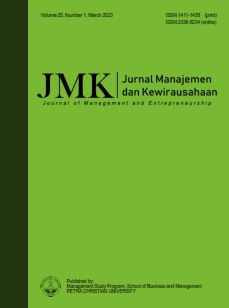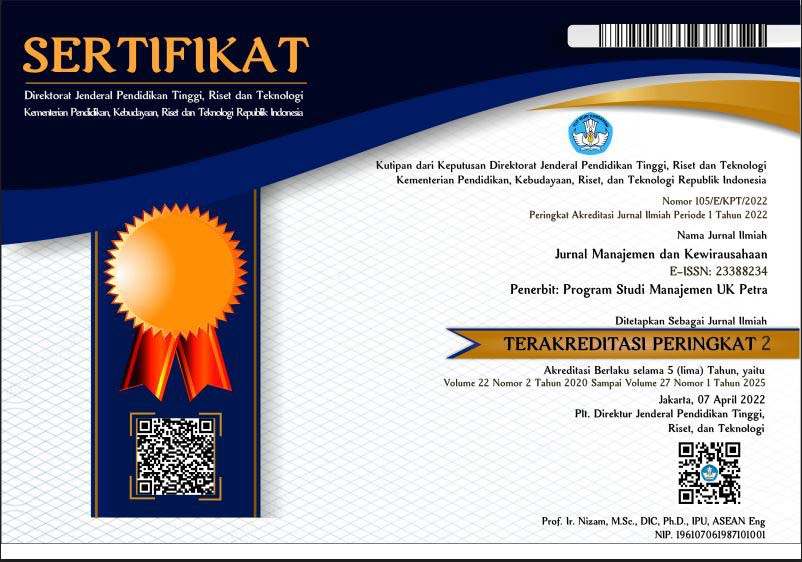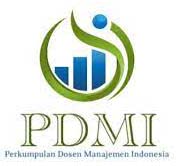WILLINGNESS TO EMBED SOCIAL SUSTAINABILITY: A CASE OF GEN Y AND GEN Z ENTREPRENEURS IN INDONESIA
 :
:
https://doi.org/10.9744/jmk.25.1.25-40
Keywords:
Social sustainability, motivators, willingness, gen Y and gen Z, entrepreneursAbstract
This research aimed to explore the motivators and willingness of Gen Y and Gen Z entrepreneurs in Indonesia to embed social sustainability in their businesses. This research employed a quantitative method via an online survey questionnaire, which was conducted based on a convenience sample of Gen Y and Gen Z alumni and students from several universities in Indonesia. The data were processed using SEM-SmartPLS3.0. The research finding showed that instrumental and normative motivators affected the willingness to embed social sustainability, while relational motivators had no effect. Previously, social sustainability research involved established industries and companies. However, this research focused on upcoming Gen Y and Gen Z entrepreneurs. The recommendations provided by this research for developing a sustainable business strategy framework in terms of social dimension for Gen Y and Gen Z entrepreneurs, among others, include strengthening the indicators of normative and instrumental motivators, and the willingness to embed social sustainability.
References
Abbasi, M. (2017). Towards socially sustainable supply chains – themes and challenges. European Business Review, 29(3), 261–303. https://doi.org/10.1108/EBR-0 3-2016-0045
Agyabeng-Mensah, Y., Ahenkorah, E., Afum, E., Dacosta, E., & Tian, Z. (2020). Green warehousing, logistics optimization, social values and ethics and economic performance: The role of supply chain sustainability. International Journal of Logistics Management, 31(3), 549–574. https://doi.org/10.1108/IJLM-10-2019-0275
Almahmoud, E & Doloi, H.K. (2015). Assessment of social sustainability in construction projects using social network analysis. Facilities, 33(3/4), 152–176. https://doi.org/10.1108/F-05-2013-0042
Al Marzouqi, A. H., Khan, M., & Hussain, M. (2020). Employee social sustainability: Prioritizing dimensions in the UAE’s airlines industry. Social Responsibility Journal, 16(3), 349–367. https://doi.org/10.1108/SRJ-07-2018-0166
Badan Pusat Statistik. (2022). Pengusaha di Indonesia Paling Banyak Lulusan SMA. 2022.
Baggott, C. (2019). If we build it, they will come. National Civic Review, 3(98), 30–33. https://doi.org/10.1002/ncr.262
Baid, V., & Jayaraman, V. (2021). Amplifying and promoting the “S ” in ESG investing: The case for social responsibility in supply chain financing. Managerial Finance, 48(8), 1279–1297. https://doi.org/10.110 8/MF-12-2021-0588
Baliga, R., Raut, R., & Kamble, S. (2020). The effect of motivators, supply, and lean maagement on sustainable supply chain management practices and performance: Systematic literature review and modeling. Benchmarking, 27(1), 347–381. https://doi.org/10.1108/BIJ-01-2019-0004
Barhate, B., & Dirani, K. M. (2022). Career aspirations of generation Z: A systematic literature review. European Journal of Training and Development, 46(1–2). https://doi.org/10.1108/EJTD-07-2020-0124
Basuki, Widyanti, R., & Rajiani, I. (2021). Nascent entrepreneurs of millennial generations in the emerging market of Indonesia. Entrepreneurial Business and Economics Review, 9(2), 151–165. https://doi.org/10.15678/EBER.2021.090210
Brønn, P. S., & Vidaver-Cohen, D. (2009). Corporate motives for social initiative: Legitimacy, sustainability, or the bottom line? Journal of Business Ethics, 87(1), 91–109. https://doi.org/10. 1007/s10551-008-9795-z
Chan, K. S., & Siu, Y. F. P. (2015). Urban governance and social sustainability: Effect of urban renewal policies in Hong Kong and Macao. Asian Education and Development Studies, 4(3), 330–342. https://doi.org/10.1108/aeds-12-2014-0060
Chen, Y., & Chen, I. J. (2019). Mixed sustainability motives, mixed results: The role of compliance and commitment in sustainable supply chain practices. Supply Chain Management, 24(5), 622–636. https://doi.org/10.1108/SCM-10-2018-0 363
Chhetri, P., Hossain, M. I., & Broom, A. (2014). Examining the generational differences in consumption patterns in South East Queensland. City, Culture and Society, 5(4), 1–9. https://doi.org/10.1016/j.ccs.2014.05.003
Cockayne, D. (2019). What is a startup firm? A methodological and epistemological investigation into research objects in economic geography. Geoforum, 107, 77–87. https://doi.org/10.1016/j.geoforum.2019.10.009
Collins, C. M., Linda, S., & Koning, M. A. S. (2007). Customers’ values, beliefs on sustainable corporate performance, and buying behavior. Psychology & Marketing, 24(6), 555–575. https://doi.org/10.1002/mar.20173
Devito, M. A., Birnholtz, J., & Hancock, J. T. (2017). Platforms, people, and perception: Using affordances to understand self-presentation on social media. Proceedings of the ACM Conference on Computer Supported Cooperative Work, CSCW, 740–754. https://doi.org/10.1145/2998181.2998192
Donaldson, T., & Preston, L. E. E. E. (1995). The stakeholder theory of the corporation: Concepts, evidence, and implications author(s). The Academy of Management Review, 20(1), 65–91. https://doi.org/10.2307/258887
Fernandes, V., Kuzey, C., Uyar, A., & Karaman, A. S. (2022). Board structure policy, board diversity and social sustainability in the logistics and transportaion sector. International Journal of Physical Distribution & Logistics Management. https://doi.org/10.1108/IJPDLM-09-2021-0415
Fernando, Y., Halili, M., Tseng, M.-L., Tseng, J. W., & Lim, M. K. (2022). Sustainable social supply chain practices and firm social performance: Framework and empirical evidence. Sustainable Production and Consumption, 32, 160–172. https://doi.org/10.1016/j.spc.2022.04.020
Fontana, E., Atif, M., & Heuer, M. (2022). Implementing social sustainability through market pressures: An interorganizational network analysis in the Pakistani apparel supply chain. International Journal of Physical Distribution and Logistics Management. https://doi.org/10.1108/IJPDLM-07-2021-0265
Ganguli, R., Padhy, S. C., & Saxena, T. (2022). The characteristics and preferences of gen Z: A review. IUP Journal of Organizational Behavior, 21(2), 79–99.
Gauthier, J. F., Stangler, D., Penzel, M., Morelix, A., Arora, L., Ortmans, J., de la Tour, A., Goeldel, N., & Rigby, D. (2019). Global startup ecosystem report 2019. Retrieved from https://startupgeno me.com/reports/global-startup-ecosystem-report-2019
Hair Jr., J. F., Sarstedt, M., Hopkins, L., & Kuppelwieser, V. G. (2014). Partial least squares structural equation modeling (PLS-SEM): An emerging tool in business research. European Business Review, 26 (2), 106–121. https://doi.org/10.1108/E BR-10-2013-0128
Hair Jr., J. F., Ringle, C. M., & Sarstedt, M. (2013). Partial least squares structural equation modeling: Rigorous applications, better results, and higher acceptance. Long Range Planning, 46(1–2), 1–12. https://doi.org/10.1016/j.lrp.2013.01.001
Hair Jr., J. F., Matthews, L. M., Matthews, R. L., & Sarstedt, M. (2017). PLS-SEM or CB-SEM: Updated guidelines on which method to use. International Journal of Multivariate Data Analysis, 1(2), 107–123. https://doi.org/10.1504/ ijmda.2017.10008574
Hansson, S. O. (2010). Technology and the notion of sustainability. Technology in Society, 32(4), 274–279.https://doi.org/10.1016/j.techsoc.2010.10. 003
Henseler, J. (2017). Bridging design and behavioral research with variance-based structural equation modeling. Journal of Advertising, 46(1), 178–192. https://doi.org/10.1080/00913367.2017.1281780
Hess, N., & Jepsen, D. M. (2009). Career stage and generational differences in psychological contracts. Career Development International, 14(3), 261–283. https://doi.org/10.1108/136204309109 66433
Hsu, H. Y., & Wang, S. K. (2019). Using Google form to collect and analyze data data. Science Scope, 40(8), 64–67.
Hussain, M., Khan, M., Ajmal, M., Sheikh, K. S., & Ahamat, A. (2019). A multi-stakeholders view of the barriers of social sustainability in healthcare supply chains: Analytic hierarchy process approach. Sustainability Accounting, Management and Policy Journal, 10(2), 290–313. https://doi.org/10.1108/sampj-05-2018-0140
Kalyanasundaram, G. (2018). Why do startups fail? A case study based empirical analysis in Bangalore. Asian Journal of Innovation and Policy, 7(1), 79–102. https://doi.org/10.7545/ajip.2018.7.1.079
Keeble, B. R. (1988). The brundtland report: “Our common future.” Medicine and War, 4(1), 17–25. https://doi.org/10.1080/07488008808408783
Kohli, A., & Hawkins, E. (2015). Motivators to adopt green supply chain initiatives. International Journal of Information Systems and Supply Chain Management, 8(4), 1–13. https://doi.org/10.4018/ijisscm.2015100101
Lau, F. X. Y. V. M. C. (2015). “LuXurY” hotel loyalty – A comparison of Chinese gen X and Y tourists to Macau. International Journal of Contemporary Hospitality Management, 27(7), 1685–1706.
Law, K. M. Y., & Gunasekaran, A. (2012). Sustaina-bility development in hightech manufacturing firms in Hong Kong: Motivators and readiness. International Journal of Production Economics, 137(1), 116–125. https://doi.org/10.1016/j.ijpe.2 012.01.022
Lee, S. Y. (2008). Drivers for the participation of small and mediumsized suppliers in green supply chain initiatives. Supply Chain Management, 13(3), 185–198. https://doi.org/10.1108/135985 40810871235
León-Bravo, V., Caniato, F., & Caridi, M. (2021). Sustainability assessment in the food supply chain: Study of a certified product in Italy. Production Planning and Control, 32(7), 567–584. https://doi.org/10.1080/09537287.2020.174 4761
Liu, Z., Zhu, L., Roberts, R., & Tong, W. (2019). Toward clinical implementation of next-generation sequencing-based genetic testing in rare diseases: Where are we? Trends in Genetics, 35(11), 852–867. https://doi.org/10.1016/j.tig.2019.08.006
Maloni, M. J., & Brown, M. E. (2006). Corporate social responsibility in the supply chain: An application in the food industry. Journal of Business Ethics, 68(1), 35–52. https://doi.org/10.1007/s105510 06-9038-0
Mani, V., Agrawal, R., & Sharma, V. (2015). Supply chain social sustainability: A comparative case analysis in Indian manufacturing industries. Procedia - Social and Behavioral Sciences, 189, 234–251. https://doi.org/10.1016/j.sbspro.2015. 03.219
Mani, V., Agrawal, R., & Sharma, V. (2016). Impediments to social sustainability adoption in the supply chain: An ism and micmac analysis in indian manufacturing industries. Global Journal of Flexible Systems Management, 17(2), 135–156. https://doi.org/10.1007/s40171-015-010 6-0
Martin, C. A. (2005). From high maintenance to high productivity: What managers need to know about Generation Y. Industrial and Commercial Training, 37(1), 39–44. https://doi.org/10.1108/00197850510699965
Mat Zain, N. H., Johari, S. N., Abdul Aziz, S. R., Ibrahim Teo, N. H., Ishak, N. H., & Othman, Z. (2021). Winning the needs of the gen Z: Gamified health awareness campaign in defeating COVID-19 Pandemic. Procedia Computer Science, 179, 974–981. https://doi.org/10.1016/j.procs.2021.01.087
Moktadir, M. A., Rahman, T., Rahman, M. H., Ali, S. M., & Paul, S. K. (2018). Drivers to sustainable manufacturing practices and circular economy: A perspective of leather industries in Bangladesh. Journal of Cleaner Production, 174, 1366–1380. https://doi.org/10.1016/j.jclepro.2017.11.063
Narimissa, O., Kangarani-Farahani, A., & Molla-Alizadeh-Zavardehi, S. (2020). Evaluation of sustainable supply chain management performance: Dimensions and aspects. Sustainable Development, 28(1), 1–12. https://doi.org/10.10 02/sd.1959
Nielsen. (2015). Global trust in advertising survey. Retrieved from https://www.niel sen.com/wp-content/uploads/sites/3/201 9/04/global-trust-in-advertising-report-sept-2015-1.pdf
Paulraj, A., Chen, I. J., & Blome, C. (2017). Motives and performance outcomes of sustainable supply chain management practices: A multi-theoretical perspective. Journal of Business Ethics, 145(2), 239–258. https://doi.org/10.1007/s10551-015-2857-0
Pimenta, M. L., Cezarino, L. O., Piato, E. L., da Silva, C. H. P., Oliveira, B. G., & Li¬boni, L. B. (2022). Supply chain resilience in a Covid-19 scenario: Mapping capabilities in a systemic framework. Sustainable Production and Consumption, 29, 649–656. https://doi.org/10.1016/j.spc.2021.10.02
Rueda, X., Garrett, R. D., & Lambin, E. F. (2017). Corporate investments in supply chain sustainability: Selecting instruments in the agrifood industry. Journal of Cleaner Production, 142, 2480–2492. https://doi.org/10.1016/j.jclepro.2016.11.026
Sajjad, A., Eweje, G., & Tappin, D. (2015). Sustainable supply chain management: Motivators and barriers. Business Strategy and the Environment, 24(7), 643–655. https://doi.org/10.1002/bse.1898
Sarstedt, M., Ringle, C. M., & Hair Jr., J. F. (2022). Partial least squares structural equation modeling. In Handbook of Market Research. https://doi.org/10.1007/978-3-319-57413-4_15
Satyro, W. C., de Almeida, C. M. V. B., Pinto, M. J. A., Contador, J. C., Giannetti, B. F., de Lima, A. F., & Fragomeni, M. A. (2022). Industry 4.0 implementation: The relevance of sustainability and the potential social impact in a developing country. Journal of Cleaner Production, 337, 130456. https://doi.org/10.1016/j.jclepro.2022.130456
Shrivastava, P. (1995). Ecocentric manage¬ment for a risk society. The Academy of Management Re-view, 20(1), 118–137. https://doi.org/10.2307/258889
Simangunsong, E. (2018a). Generation-Z buying behaviour in Indonesia: opportunities for retail businesses. Mix: Jurnal Ilmiah Manajemen, 8(2), 243–253. https://doi.org/10.22441/mix.2018.v8i2.004
Simangunsong, E. (2018b). Responsible purchasing in Indonesia: Identification of drivers and barriers. International Journal of Business and Society, 19(2), 387–400.
Srisathan, W. A., Ketkaew, C., Jitjak, W., Ngiwphrom, S., & Naruetharadhol, P. (2022). Open innovation as a strategy for collaboration-based business model innovation: The moderating effect among multigenerational entrepreneurs. PLoS ONE, 17(6), e0265025. https://doi.org/10.1371/journal. pone.0265025
Starik, M., & Rands, G. (1995). Weaving an in¬tegrated web: Multilevel and multi-system perspectives of ecologically sustainable organizations. The Aca-demy of Management Review, 20(4), 908–935.
Sudusinghe, J. I., Pradeepa Jayaratne, R., & Kumarage, A. S. (2018). UN SDGs shaping sustainable supply chains: The case of apparel manufacturers in developing countries. Proceedings of the 2018 IEEE International Conference on Service Operations and Logistics, and Informatics, SOLI 2018, July, 102–107. https://doi.org/10.1109/ soli.2018.8476697
Tate, W. L., Ellram, L. M., & Kirchoff, J. F. (2010). Corporate social responsibility reports: A thematic analysis related to supply chain management. Journal of Supply Chain Management, 46(1), 19–44. https://doi.org/10.1111/j.1745-493X.2009.03184.x
Taylor, K. M., & Vachon, S. (2018). Empirical research on sustainable supply chains: IJPR’s contribution and research avenues. International Journal of Production Research, 56(1–2), 950–959. https://doi.org/10.1080/00207543.2017.140 2139
Tjiptono, F., Khan, G., Yeong, E. S., & Kunchamboo, V. (2020). Generation Z in Malaysia: The four ‘E’ generation. In Gentina, E., & Parry, E. (Eds.) The new generation Z in Asia: Dynamics, differences, digitalisation (The changing context of managing people), Emerald Publishing Limited, Bingley, pp. 149–163. https://doi.org/10.1108/ 978-1-80043-220-820201015
Travaillé, D., & Naro, G. (2017). Management control facing the challenges of overall performance: A study carried out with management controllers. Society and Business Review, 12(2), 175–199. https://doi.org/10.1108/SBR-11-2016-0065
Tseng, M. L., Tran, T. P. T., Ha, H. M., Bui, T. D., & Lim, M. K. (2021). Sustainable industrial and operation engineering trends and challenges Toward Industry 4.0: A data driven analysis. Journal of Industrial and Production Engineering, 38(8), 581–598. https://doi.org/10.1080/21681015.2021.1950227
Vanpoucke, E., Quintens, L., & Van Engelshoven, M. (2016). The role of motivation in relating green supply chain management to performance. Supply Chain Management: An International Journal, 21(6), 732–742. http://dx.doi.org/10.110 8/SCM-05-2016-0143
Venkatesh, V. G., Zhang, A., Deakins, E., & Mani, V. (2020). Drivers of sub-supplier social sustainability compliance: An emerging economy perspective. Supply Chain Management, 25(6), 655–677. https://doi.org/10.1108/SCM-07-2019-0251
Walker, H., Di Sisto, L., & McBain, D. (2008). Drivers and barriers to environmental supply chain management practices: Lessons from the public and private sectors. Journal of Purchasing and Sup¬ply Management, 14(1), 69–85. https://doi. org/10.1016/j.pursup.2008.01.007
World Economic Forum. (2019). ASEAN youth: Technology, skills and the future of work. Retri-eved from https://www.weforum.org/reports/ asean-youth-technology-skills-and-the-future-of-work
Wuryaningrat, N. F., Katuuk, D. A., Kumajas, L. I., & Tuerah, I. J. C. (2021). Millennials’ social perceptions when implementing new habit adaptations in North Sulawesi. Society, 9(2), 539–556. https://doi.org/10.33019/society.v9i2.313
Yıldızbaşı, A., Öztürk, C., Efendioğlu, D., & Bulkan, S. (2021). Assessing the social sustainable supply chain indicators using an integrated fuzzy multi-criteria decisionmaking methods: A case study of Turkey. Environment, Development and Sustainability, 23, 4285–4320. https://doi.org/10.1007/s10668-020-00774-2
Zainee, I. A., & Puteh, F. (2020). Corporate social responsibility impact on talent retention among Generation Y. Revista de Gestao, 27(4), 369–392. https://doi.org /10.1108/REGE-06-2019-0070
Downloads
Published
How to Cite
Issue
Section
License
Authors who publish on this journal agree to the following terms:
- Authors retain copyright and grant the journal right of first publication with the work simultaneously licensed under a Creative Commons Attribution License that allows others to share the work with an acknowledgement of the work's authorship and initial publication in this journal.
- Authors are able to enter into separate, additional contractual arrangements for the non-exclusive distribution of the journal's published version of the work (e.g., post it to an institutional repository or publish it in a book), with an acknowledgement of its initial publication in this journal.
- Authors are permitted and encouraged to post their work online (e.g., in institutional repositories or on their website) prior to and during the submission process, as it can lead to productive exchanges, as well as earlier and greater citation of published work (See The Effect of Open Access).


















